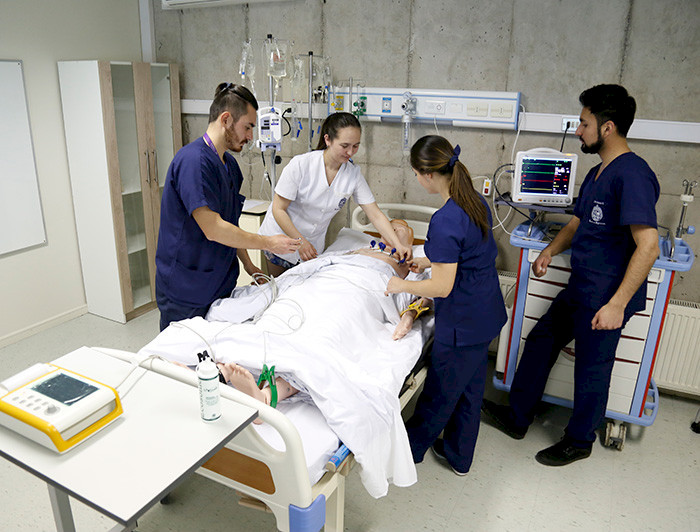
UC Chile School of Nursing: Pioneer in Advanced Practice
Making diagnoses, indicating treatments and performing clinical follow-ups are some of the competencies that until a few years ago were restricted to physicians. Today they are part of a master's program offered by the Universidad Católica's School of Nursing in collaboration with higher education institutions in the United States.

photo_camera UC Chile has worked collaboratively with American universities that lead the way in the Advanced Nursing Practice, such as Boston College, the University of Miami and the University of Alabama. (Photo by: Karina Fuenzalida)
Back in 2014, Latin America was facing severe coverage and health-care access issues.
In view of this, the World Health Organization decided to call for countries to train advanced practice nurses, i.e., nurses who could perform some functions traditionally restricted to physicians.
Through the School of Nursing, the University took on the challenge of training nurses who could diagnose, treat and provide clinical follow-up for people with specific pathologies, tasks that until then were restricted in Chile and the region to those who had studied medicine.
Such programs are not new. In the 1960s, in the United States, registered nurses began to be trained in an attempt to respond mainly to the challenges faced by child health. The idea was to provide more comprehensive care for children from the most socially vulnerable households.
However, there was nothing quite like this in Chile.
The Master of Advanced Nursing Practice with an emphasis in Oncology (EPA, as per its Spanish acronym) was launched in March. It began last year with a pilot group and formally started this year.
“The format of the Advanced Nursing Practice program that we have developed at the school did not exist in Chile," explained Francisca Márquez, director of graduate studies at the UC Chile School of Nursing. For this reason, UC Chile has worked collaboratively with American universities that lead the way in this type of training, such as:
Lilian Ferrer, current Vice President of International Affairs, and Francisca Márquez, both faculty at the UC Chile School of Nursing, have also promoted networking with various North American institutions.
The Master of Advanced Practice Nursing with an emphasis on Oncology that UC Chile offers today, has outstanding international professors, including:
- Juan M. González, Director of Advanced Practice Critical Care Nursing at the University of Miami
- Susan Kelly-Weeder, Associate Dean for Graduate Programs at Boston College Connell School of Nursing
In addition to Chilean professor Magdalena Correa, a Master of Science in Nursing from Boston College.
Improving Cancer Patient Care
Cancer is the leading cause of death in Chile, overtaking the circulatory system diseases, according to studies released last December by the National Institute of Statistics (INE, as per its Spanish acronym).
Among the causes of the increase—estimated at around 25,000 deaths annually—is the aging of the population and also the fact that other conditions, such as diabetes and high blood pressure, have been successfully addressed.
Francisca Márquez, director of graduate studies at the UC Chile School of Nursing, explained that one of the problems the country is currently facing is the lack of cancer specialists.
"The shortage of oncologists is shocking. Today in Chile there are 2.9 oncologists per million inhabitants, and the WHO recommendation is at least 21 per million inhabitants,” she said.
This need explains why the Master of Advanced Practice Nursing focuses on oncology.
In 2018, the National Cancer Plan began to be promoted. In this context, the medical oncologist Bruno Nervi, head of the UC Chile Cancer Program and president of Fundación Chile Sin Cáncer, invited the School of Nursing to contribute to training.
“The National Cancer Plan established that it was important to train professionals in advanced practice nursing," explained Márquez, and also stipulated the infrastructure needed to be strengthen and the number of oncology centers in the country had to increase from 7 to 16 nationwide.
Challenge: Positioning the New Role
One of the challenges in implementing Advanced Practice Nursing in the country is to have this role recognized in hospitals and clinics.
"It is very important to position the role, because one thing is to train people, and another thing is that they can effectively perform their roles in hospitals and clinics," stressed Francisca Márquez.
It is at this level that international cooperation is extremely relevant, as UC Chile has been working on the matter together with its partner Christus Health (partners since 2013 in the UC CHRISTUS Health Network).
"We have had the opportunity to travel to Texas to be able to evaluate on site the role of advanced practice nursing at Christus. This cooperation initiative has been key, because Christus knows how this specialization can be implemented and we have had that space to incorporate the nurses," said Márquez.
This is also supported by the fact that several of the nurses who have specialized in advanced practice or who are studying for a master's degree are working at the UC CHRISTUS Health Network.
Between the pilot program that began last year, and the master's program launched this year, there are already 21 students.
The School of Nursing is already working on new tracks for the master's program, such as palliative care, primary care and critical care.
Pioneering Experience in Latin America

During the first semester of 2022, the American professor Juan M. González taught the pathophysiology course of the master's program and reviewed contents related to immunology, cardiology and hematology.
The faculty highlighted the importance of advanced practice nursing in the United States, a country where those who have specialized in Advanced Practice Nursing can diagnose and order tests.
"It has been a unique experience and I am glad to be part of this initiative in an area that has not been very developed in Latin America, but in which Chile and the UC Chile are assuming an interesting leadership,” he said.
Along with highlighting the quality and level of those who participated in the course, the professor recognized that the UC Chile School of Nursing is being "a pioneer, opening a path of advanced practice that other universities in Chile can also follow.”
He also emphasized the importance of international collaboration. "This is a very symbiotic relationship, in which collaboration allows bridges to be built and information to be exchanged regarding the practice of both countries."
The course taught by the faculty concluded with a simulation that was carried out face-to-face at the San Joaquin campus with a patient actor, in which four scenarios were set up.
"There are several studies that show that students often have difficulty retaining the content that is reviewed in class, but if they see it in practice, and can perform a procedure, they tend to remember it better. So, simulation provides us with an excellent venue, which is safe and does not harm the patient, and at the same time the student can really conceptualize that content," González explained.
He added that these same contents could be adapted in other Latin American countries such as the Dominican Republic and Guatemala, which face similar challenges.
The Vice President of International Affairs, Lilian Ferrer, who is a UC Chile nurse-midwife and holds a PhD in Public Health Sciences from the University of Illinois in Chicago, highlighted the efforts made by the School of Nursing in its relations with foreign institutions.
"International collaboration allows universities to contribute through the generation of new knowledge and their public commitment, to a better development of the country and also of the region, especially considering how much innovation is needed in health care.”


